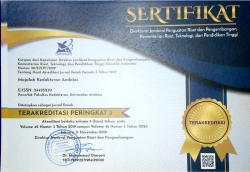Effect of Dadih Probiotics on Malondialdehyde Levels in Diabetic Mellitus Rats With Alloxan Induction
Abstract
Objective : This research aims to analyze the effect of dadih probiotics on MDA levels in alloxan-induced diabetic rats. Methods : This study used an experimental design with a post-test-only control group. Wistar strain white rat samples were divided into 4 groups. The negative group was not given any treatment, K(+), P1, and P2 were induced by alloxan 150 mg/kg BW on the first day. Groups P1 and P2 were given dadih probiotic doses of 1.87 g/200 gBW and 3.74 g/200 gBW on days 4 to 17. Results : Measurement of MDA levels was carried out on the 18th day. Data were analyzed with One Way Anova and a post-hoc test. The research results are statistically significant if p-value <0.05. The average levels of MDA K- 2.29 nmol/mL, K+ 3.77 nmol/mL, P1 2.97 nmol/mL, and P2 2.53 nmol/mL. Based on statistical tests, there was an effect of dadih probiotics on MDA levels as evidenced by a p-value < 0,05. Conclusion : Dadih probiotic doses of 1.87 g/200gBW and 3.74 g/200gBW can reduce MDA levels in rats.
Keywords
Full Text:
PDFReferences
PERKENI. Pedoman Pengelolaan dan Pencegahan Diabetes Mellitus Tipe 2 Dewasa Di Indonesia 2021. Indonesia: PB PERKENI; 2021.
WHO. Classification of Diabetes Mellitus 2020 2020.
Balitbangkes Kemenkes RI. Hasil Utama Riskesdas. 2018.
Decroli E. DIABETS MELITUS TIPE 2. Y. P. E. Kam, Alexander, G. P. Decroli, & A. Rahmadi (eds.); Pertama); 2019.
Noor SK, Elmadhoun WM, Bushara SO, Almobarak AO, Salim RS, Forawi SA, et al. Glycaemic control in Sudanese individuals with type 2 diabetes: Population based study. Diabetes Metab Syndr Clin Res Rev 2017. https://doi.org/10.1016/j.dsx.2016.12.024.
Rezaei M, Sanagoo A, Jouybari L, Behnampoo N, Kavosi A. The effect of probiotic yogurt on blood glucose and cardiovascular biomarkers in patients with type II diabetes: A randomized controlled trial. Evid Based Care J 2016. https://doi.org/10.22038/ebcj.2016.7984.
Chen P, Zhang Q, Dang H, Liu X, Tian F, Zhao J, et al. Screening for potential new probiotic based on probiotic properties and α-glucosidase inhibitory activity. Food Control 2014. https://doi.org/10.1016/j.foodcont.2013.06.027.
Arnold M, Rajagukguk YV, Gramza-Michałowska A. Characterization of dadih: Traditional fermented buffalo milk of minangkabau. Beverages 2021. https://doi.org/10.3390/beverages7030060.
Schwartz SS, Epstein S, Corkey BE, Grant SFA, Gavin JR, Aguilar RB. The time is right for a new classification system for diabetes: Rationale and implications of the β-cell-centric classification schema. Diabetes Care 2016. https://doi.org/10.2337/dc15-1585.
Larsen N, Vogensen FK, Van Den Berg FWJ, Nielsen DS, Andreasen AS, Pedersen BK, et al. Gut microbiota in human adults with type 2 diabetes differs from non-diabetic adults. PLoS One 2010. https://doi.org/10.1371/journal.pone.0009085.
Allin KH, Nielsen T, Pedersen O. Mechanisms in endocrinology: Gut microbiota in patients with type 2 diabetes mellitus. Eur J Endocrinol 2015. https://doi.org/10.1530/EJE-14-0874.
Gomes AC, Bueno AA, De Souza RGMH, Mota JF. Gut microbiota, probiotics and diabetes. Nutr J 2014. https://doi.org/10.1186/1475-2891-13-60.
Salazar J, Angarita L, Morillo V, Navarro C, Martínez MS, Chacín M, et al. Microbiota and diabetes mellitus: Role of lipid mediators. Nutrients 2020. https://doi.org/10.3390/nu12103039.
Tonucci LB, Olbrich dos Santos KM, Licursi de Oliveira L, Rocha Ribeiro SM, Duarte Martino HS. Clinical application of probiotics in type 2 diabetes mellitus: A randomized, double-blind, placebo-controlled study. Clin Nutr 2017. https://doi.org/10.1016/j.clnu.2015.11.011.
Lobet E, Letesson JJ, Arnould T. Mitochondria: A target for bacteria. Biochem Pharmacol 2015. https://doi.org/10.1016/j.bcp.2015.02.007.
Newsholme P, Cruzat VF, Keane KN, Carlessi R, De Bittencourt PIH. Molecular mechanisms of ROS production and oxidative stress in diabetes. Biochem J 2016. https://doi.org/10.1042/BCJ20160503C.
Wirawati CU, Sudarwanto MB, Lukman DW, Wientarsih I, Srihanto EA. Diversity of lactic acid bacteria in dadih produced by either back-slopping or spontaneous fermentation from two different regions of West Sumatra, Indonesia. Vet World 2019. https://doi.org/10.14202/vetworld.2019.823-829.
Jurnalis YD. Pengaruh Pemberian Dadih Terhadap Keseimbangan Mikroflora Usus dan Tinggi Vili Ileum. Sari Pediatr 2020. https://doi.org/10.14238/sp21.4.2019.207-12.
Kusuma RJ, Azzyati F, Purbarani G, Sulistyorini R, Huriyati E. Effect of Traditional Fermented Buffalo Milk (Dadih) On Body Weight, Adipose Tissue Mass and Adiposity Inflammation in High Fat-Induced Obese Rats. EC Nutr 2015;1:106–14.
Esfandi R, Walters ME, Tsopmo A. Antioxidant properties and potential mechanisms of hydrolyzed proteins and peptides from cereals. Heliyon 2019. https://doi.org/10.1016/j.heliyon.2019.e01538.
Ejtahed HS, Mohtadi-Nia J, Homayouni-Rad A, Niafar M, Asghari-Jafarabadi M, Mofid V. Probiotic yogurt improves antioxidant status in type 2 diabetic patients. Nutrition 2012. https://doi.org/10.1016/j.nut.2011.08.013.
Zeng Z, Yuan Q, Yu R, Zhang J, Ma H, Chen S. Ameliorative Effects of Probiotic Lactobacillus paracasei NL41 on Insulin Sensitivity, Oxidative Stress, and Beta-Cell Function in a Type 2 Diabetes Mellitus Rat Model. Mol Nutr Food Res 2019. https://doi.org/10.1002/mnfr.201900457.
Mazloom Z, Yousefinejad A, Dabbaghmanesh MH. Effect of probiotics on lipid profile, glycemic control, insulin action, oxidative stress, and inflammatory markers in patients with type 2 diabetes: A clinical trial. Iran J Med Sci 2013.
Asemi Z, Zare Z, Shakeri H, Sabihi SS, Esmaillzadeh A. Effect of multispecies probiotic supplements on metabolic profiles, hs-CRP, and oxidative stress in patients with type 2 diabetes. Ann Nutr Metab 2013. https://doi.org/10.1159/000349922.
Raygan F, Rezavandi Z, Bahmani F, Ostadmohammadi V, Mansournia MA, Tajabadi-Ebrahimi M, et al. The effects of probiotic supplementation on metabolic status in type 2 diabetic patients with coronary heart disease IRCT2017082733941N5 IRCT. Diabetol Metab Syndr 2018. https://doi.org/10.1186/s13098-018-0353-2.





















